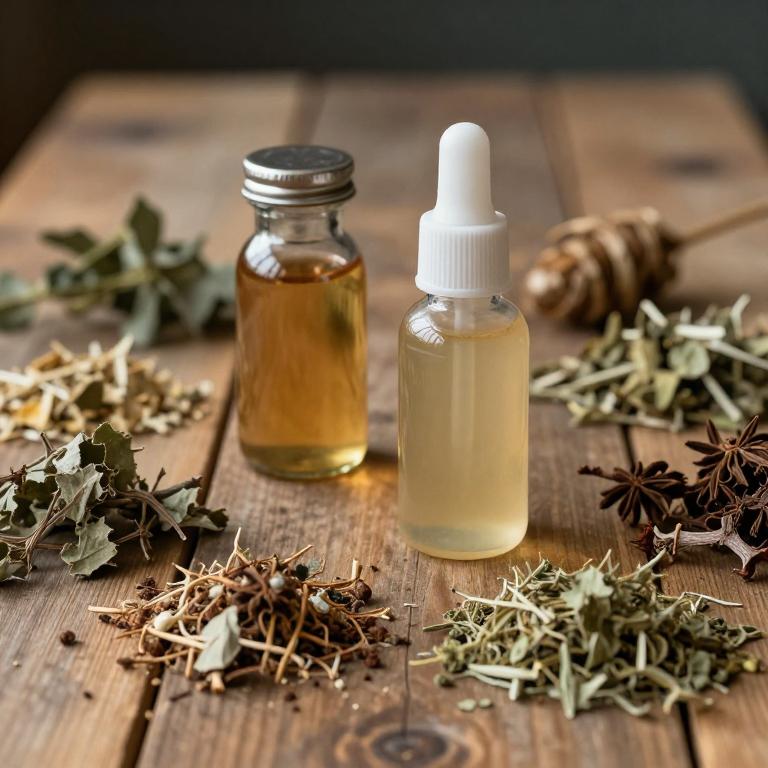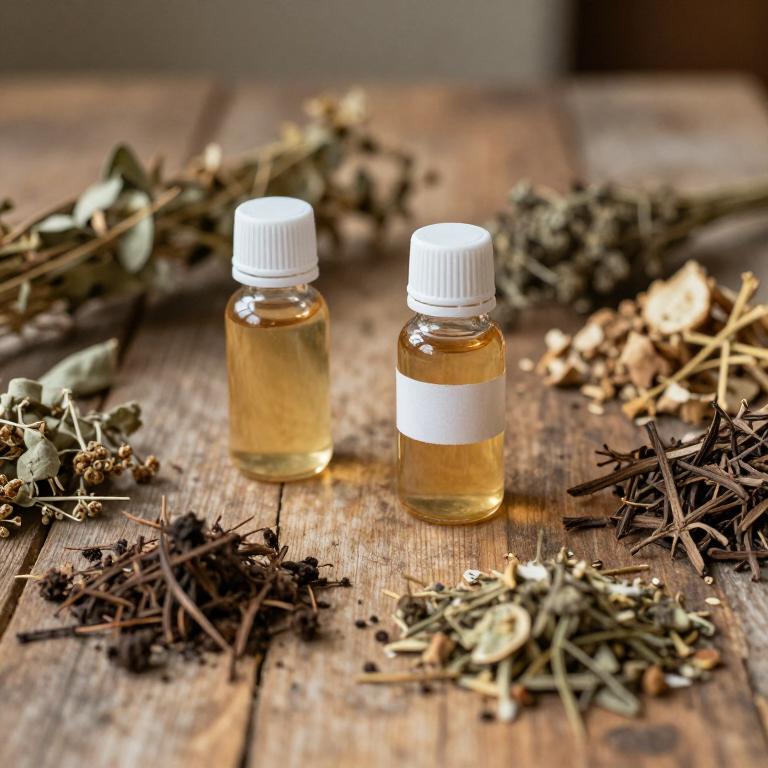10 Best Herbal Linctuses For Shortness Of Breath

Herbal linctuses are traditional remedies used to alleviate symptoms of shortness of breath, particularly in conditions like asthma, bronchitis, or chronic obstructive pulmonary disease (COPD).
These formulations often contain natural ingredients such as ginger, licorice root, eucalyptus, and thyme, which are known for their expectorant and soothing properties. They work by helping to loosen mucus, reduce inflammation in the airways, and ease respiratory discomfort. While they may provide some relief, they are generally considered complementary rather than a substitute for prescribed medications.
It is important to consult a healthcare professional before using herbal linctuses, especially for individuals with severe or persistent breathing difficulties.
Table of Contents
- 1. Eucalyptus (Eucalyptus globulus)
- 2. Thyme (Thymus vulgaris)
- 3. Peppermint (Mentha piperita)
- 4. Rosemary (Rosmarinus officinalis)
- 5. Ceylon cinnamon (Cinnamomum verum)
- 6. Fennel (Foeniculum vulgare)
- 7. Salvia (Salvia officinalis)
- 8. Ginger (Zingiber officinale)
- 9. Parsley (Petroselinum crispum)
- 10. Scots pine (Pinus sylvestris)
1. Eucalyptus (Eucalyptus globulus)

Eucalyptus globulus, commonly known as eucalyptus, is often used in herbal linctuses to alleviate symptoms of shortness of breath.
These linctuses typically contain eucalyptus oil, which has expectorant and decongestant properties that help loosen mucus and clear the airways. The aromatic compounds in eucalyptus may also provide a soothing effect, making it easier to breathe. However, it is important to consult a healthcare professional before using these linctuses, especially for individuals with underlying respiratory conditions or allergies.
While eucalyptus globulus may offer some relief, it should not replace prescribed treatments for severe or persistent shortness of breath.
2. Thyme (Thymus vulgaris)

Thymus vulgaris, commonly known as thyme, is a traditional herbal remedy that has been used for centuries to alleviate respiratory symptoms, including shortness of breath.
Thyme linctuses, often made from thyme essential oil or dried thyme leaves, are believed to work by stimulating the respiratory system and helping to clear mucus from the airways. The active compound, thymol, possesses antimicrobial and expectorant properties that may reduce inflammation and improve breathing in individuals with mild respiratory conditions. While thyme linctuses are generally considered safe when used as directed, they should not replace professional medical advice for severe or persistent shortness of breath.
It is advisable to consult a healthcare provider before using thyme linctuses, especially for those with underlying health conditions or who are taking other medications.
3. Peppermint (Mentha piperita)

Mentha piperita, commonly known as peppermint, is often used in herbal linctuses to alleviate symptoms of shortness of breath.
These linctuses typically contain menthol, which has a cooling effect and can help relax the airway muscles, making breathing easier. The menthol in peppermint linctuses may also help reduce mucus production and soothe irritated airways, providing relief for individuals experiencing respiratory discomfort. While not a substitute for medical treatment, these herbal remedies can be a complementary option for mild respiratory issues.
However, it is important to consult a healthcare professional before using peppermint linctuses, especially for individuals with underlying health conditions or those taking other medications.
4. Rosemary (Rosmarinus officinalis)

Rosmarinus officinalis, commonly known as rosemary, has been traditionally used in herbal linctuses to alleviate symptoms of shortness of breath.
These linctuses often contain rosemary essential oil, which is believed to have bronchodilatory and anti-inflammatory properties that may help ease respiratory distress. The aromatic compounds in rosemary are thought to stimulate the respiratory system, promoting clearer breathing and reducing congestion. While scientific evidence supporting its efficacy is limited, many users report a sense of relief after using rosemary-based linctuses.
As with any herbal remedy, it is important to consult a healthcare professional before use, especially for individuals with chronic respiratory conditions.
5. Ceylon cinnamon (Cinnamomum verum)

Cinnamomum verum, commonly known as true cinnamon, has been traditionally used in herbal medicine for its potential soothing properties.
While it is not a primary treatment for shortness of breath, some herbal linctuses containing cinnamon may help alleviate mild respiratory discomfort by reducing inflammation and acting as a mild expectorant. These linctuses are often used as complementary remedies in supportive care for conditions like bronchitis or asthma, though they should not replace prescribed medical treatments. It is important to consult a healthcare professional before using cinnamon-based products, especially for individuals with underlying health conditions or those taking other medications.
The use of Cinnamomum verum in linctuses should be approached with caution and under proper guidance to ensure safety and efficacy.
6. Fennel (Foeniculum vulgare)

Foeniculum vulgare, commonly known as fennel, has been traditionally used in herbal medicine to prepare linctuses for alleviating symptoms of shortness of breath.
These linctuses are typically made by infusing fennel seeds in a sweetened syrup, which can help soothe the respiratory tract and ease breathing. The essential oils in fennel, such as anethole, possess expectorant and antispasmodic properties that may reduce bronchial spasms and loosen mucus, making it easier to expel. While fennel linctuses are often used for conditions like bronchitis or asthma, they should be used under the guidance of a healthcare professional, especially for individuals with chronic respiratory issues.
Overall, fennel-based linctuses offer a natural, soothing option for managing shortness of breath, though their efficacy may vary depending on the individual and the underlying cause of the condition.
7. Salvia (Salvia officinalis)

Salvia officinalis, commonly known as sage, has been traditionally used in herbal medicine for its potential respiratory benefits, including alleviating symptoms of shortness of breath.
Sage contains compounds such as rosmarinic acid and flavonoids, which may help reduce inflammation and improve lung function. Herbal linctuses made from sage are often prepared by combining the dried leaves with honey or other natural sweeteners to create a soothing throat and respiratory remedy. These linctuses are believed to help ease coughing and clear mucus, thereby supporting easier breathing.
While more research is needed to confirm their efficacy, sage-based linctuses are considered a natural alternative for those seeking relief from respiratory discomfort.
8. Ginger (Zingiber officinale)

Zingiber officinale, commonly known as ginger, has been traditionally used in herbal medicine to alleviate respiratory symptoms, including shortness of breath.
Ginger linctuses, which are medicinal syrups containing ground ginger, are believed to help reduce inflammation in the airways and improve respiratory function. These linctuses may act by promoting expectoration, soothing irritated airway tissues, and enhancing mucous clearance. While some studies suggest that ginger may have mild bronchodilatory effects, more research is needed to confirm its efficacy for shortness of breath.
As with any herbal remedy, it is important to consult a healthcare provider before using ginger linctuses, especially for individuals with underlying health conditions or those taking other medications.
9. Parsley (Petroselinum crispum)

Petroselinum crispum, commonly known as parsley, has been traditionally used in herbal medicine for its potential respiratory benefits.
When prepared as a linctus, or herbal syrup, parsley may help alleviate symptoms of shortness of breath by acting as a mild expectorant and soothing the airways. The essential oils in parsley, such as apiol and limonene, are believed to have anti-inflammatory and bronchodilating properties that may support respiratory function. While there is limited scientific evidence on its efficacy for shortness of breath, some individuals find relief from using parsley linctus as part of a holistic approach to respiratory health.
It is important to consult with a healthcare provider before using parsley or any herbal remedy, especially for those with chronic respiratory conditions.
10. Scots pine (Pinus sylvestris)

Pinus sylvestris, commonly known as Scots pine, has been traditionally used in herbal medicine for its potential respiratory benefits, including alleviating symptoms of shortness of breath.
The essential oils derived from the needles of this tree contain compounds such as pinene and camphor, which may help to open up airways and reduce bronchial constriction. Herbal linctuses made from Pinus sylvestris are often used to soothe coughing and ease breathing in individuals suffering from respiratory conditions. These formulations are typically prepared with a base of honey or glycerin to enhance their soothing properties and improve palatability.
While they are not a substitute for medical treatment, they may offer natural relief for mild cases of shortness of breath when used as part of a holistic approach to respiratory health.